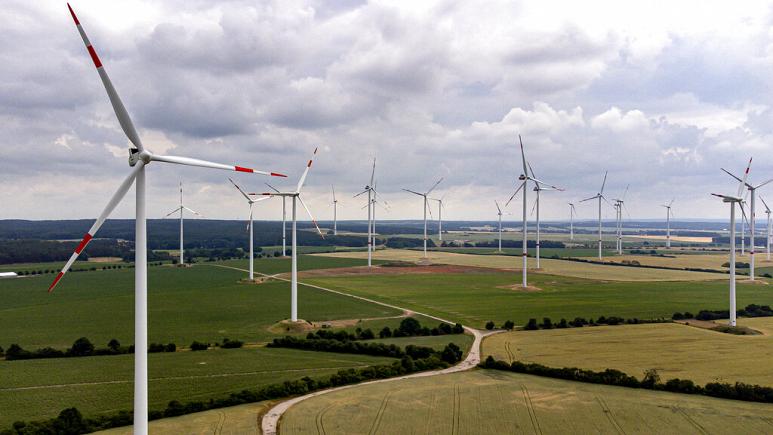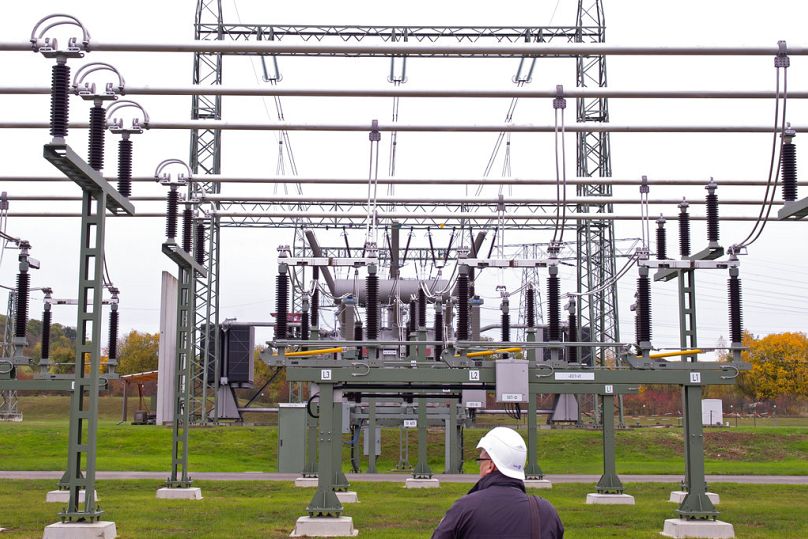Energy prices surge as Ukraine crisis deepens
The 'Odervorland' wind farm is pictured in Jacobsdorf near Frankfurt an der Oder, Germany, Friday, June 25, 2021.

Oil prices surged nearly 5% and stock prices dropped after Russian President Vladimir Putin recognised the independence of rebel-held regions of Ukraine on Monday evening, raising fears that a full-scale invasion was near.
Russia is a major energy producer and the tensions over Ukraine have brought wide swings in volatile energy prices, on top of the inevitable risks of a broader conflict.
Oil prices already had surged recently to their highest level since 2014. The price of Brent crude, the standard for international oils, gained about $4.50, or nearly 5%, to hit about $98 (€86) per barrel.
The US and European Union condemned Russia and prepared to hit back with sanctions. On Tuesday, Germany suspended the approval process for the Nord Stream 2 pipeline that would bring Russian natural gas to Europe. Western powers have feared Russia might use skirmishes in Ukraine’s eastern regions as a pretext for an attack on the democracy, which has defied Moscow’s attempts to pull it back into its orbit.
Former Russian president Dmitry Medvedev tweeted on Tuesday afternoon that gas prices would soar for Europeans following Germany’s decision.
European leaders rapidly rethinking energy supply security
Rising energy prices and fears of a Russian invasion of Ukraine are making European leaders think hard about energy security, particularly their decades-old reliance on Moscow for natural gas.
The crisis shows Europe’s vulnerability after years of limited progress in completing an “energy union” – a 2015 vision to allow affordable gas and electricity to flow across borders while diversifying suppliers and reaching climate goals.
As renewables like solar and wind are slowly built up and coal and other fossil fuels are phased out, Europe still needs natural gas, and it’s dependent on Russia to get it.
That came into sharp relief as Europe’s gas supply dropped and prices soared partly because Russia sold less gas than normal, squeezing households and businesses with rising costs.
With gas reserves low and concerns a war could interrupt pipeline flows from Russia, the EU is focused on getting liquefied natural gas, or LNG, by ship from the United States, Qatar, Algeria and elsewhere until renewables catch up. Environmentalists fear making that even a short-term priority could set back Europe’s goals to move away from fossil fuels.
EU needs more renewable energy to reduce dependency on Russia
Doubling down on renewables would help reduce dependency on Russian gas, EU Energy Commissioner Kadri Simson said on Monday while reiterating that energy security was critical. An advisory group to coordinate the EU’s gas supply security was meeting on Tuesday because “it’s important that contingency plans are ready for the worst-case scenario,” she said.
Speaking to Spanish politicians on a visit to Madrid, Simson briefed them on the latest security of supply developments and the situation in Ukraine, but said Europe was at a “crossroads” and needed “more unity than ever.”






